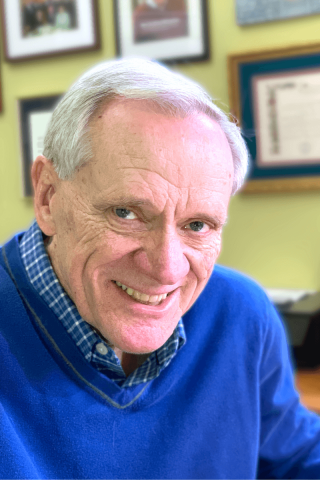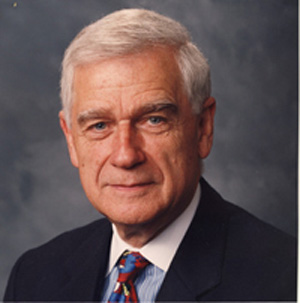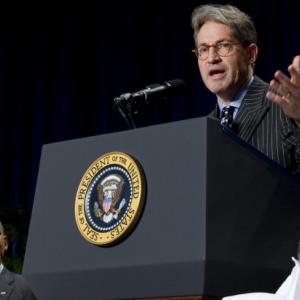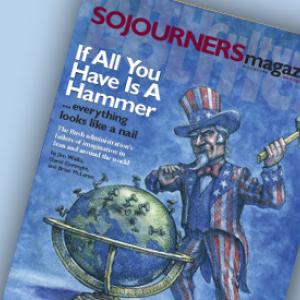
Wes Granberg-Michaelson is a contributing editor to Sojourners. His forthcoming book is The Soulwork of Justice: Four Movements of Contemplative Action (Orbis Books).
His other books includeing Without Oars: Casting Off into a Life of Pilgrimage, From Times Square to Timbuktu: The Post-Christian West Meets the Non-Western Church, and Future Faith: Ten Challenges for Reshaping Christianity in the 21st Century.
He served as general secretary of the Reformed Church in America for 17 years from 1994 to 2011. Previously he held the position of director of church and society at the World Council of Churches in Geneva. Earlier in his career he served as executive and legislative assistant to U.S. Senator Mark O. Hatfield (1968-1976) and then as the associate editor of Sojourners magazine when it was founded. He played a leading role in establishing Christian Churches Together in the USA, and presently helps guide the development of the Global Christian Forum. Over the course of his ministry his ecumenical work has taken him to all corners of the world. In addition to the recent titles listed above, he is the author of Underexpected Destinations: An Evangelical Pilgrimage to World Christianity and Leadership from Inside Out: Spirituality and Organizational Change, as well as four other earlier books. His numerous magazine articles have appeared in Sojourners, The Christian Century, The Church Herald, Ecumenical Review, and other publications.
In the fall of 2012, Granberg-Michaelson was appointed as a Distinguished Visiting Scholar at the John W. Kluge Center of the Library of Congress. While there he researched and wrote the book From Times Square to Timbuktu: The Post-Christian West Meets the Non-Western Church (Eerdmans, Fall 2013). The book deals with the effects of the shift in world Christianity to the global South, and impact of global migration on congregational life and society in the global North. It was chosen to be part of the 2013 National Book Festival in Washington, D. C.
Granberg-Michaelson is a graduate of Hope College and Western Theological Seminary, both in Holland, Michigan, and was ordained as a Minister of Word and Sacrament in the Reformed Church in America in 1984. Presently he continues his work in ecumenical organizations, in writing and public speaking on issues facing world Christianity, and consulting to church-related organizations. He serves today on the governing boards of Church Innovations and the Global Christian Forum. His wife, Kaarin Granberg-Michaelson, is an ordained minister in the Reformed Church in America, and they have two children. He and Kaarin live in Santa Fe, New Mexico.
Posts By This Author
Power, Prayer and Money
It’s been several years since I’ve attended a National Prayer Breakfast, the annual event held Thursday morning in Washington, D.C., attended by the President, members of Congress, and guests — about 2,500 of them.
When I lived and worked in D.C. I attended almost every year. Senator Mark Hatfield, for whom I worked, was a faithful member of the Senate Prayer breakfast group which met weekly, and with the group in the House, sponsors the this national event.
My worry always has been that such a gathering merely sprinkles holy water on the nation’s powerful leaders without any real accountability to the prophetic message of the Gospel. As a breakfast speaker one year, Hatfield called for national repentance for arrogance and sin, referring especially to the Vietnam War. His comments broke with the normal rhetorical decorum of the event and angered President Nixon, but received widespread coverage and much respect.
These days, the early-morning prayer breakfast is also accompanied by countless luncheons, dinners, and seminars for people who come from around the nation and the world to attend. The idea behind the prayer breakfast movement is simple: Gather politicians and leaders together in a country (or state, or city) to pray with one another “in the Spirit of Jesus,” and hope that this dependence on God will transcend differences to build a movement grounded in love for one another and one’s neighbor. It’s supposed to be devoid of “politics.”
Wes Granberg-Michaelson Answers, "What is an Evangelical?"
“Evangelical voters” have now been sized and squeezed into a homogeneous political block. These folks have views on the political right wing, trust in robust American military might, believe that wealth is a blessing to be protected by tax policy, want society to be inhospitable toward gays, oppose any form of abortion, feel that “big” government is always malevolent, and assert that American individualism is the divinely sanctioned cornerstone of the Republic. Apply the label “evangelical” to a voter and you can expect these political responses.
The problem is that it’s simply inaccurate. One size doesn’t fit all when in come to evangelicals. It distorts reality. But that’s just too inconvenient for pundits intent on predicting how various blocks will vote.
The Cuban Journal

Cuba, Dec. 8, 2008. Image via Wylio: http://bit.ly/tQNsK3
Earlier this month, Sojourners board member and former General Secretary of the Reformed Church in America, Wes Granberg-Michaelson, journeyed to Cuba with a delegation of religious leaders from the National Council of Churches.
Their visit culminated in a joint declaration celebrating signs of unity between the U.S. and Cuban churches. Sixteen representatives of U.S. National Council of Churches member communions were in Cuba November 28 through December 2 meeting with Cuban church and political leaders, including President Raúl Castro.
The delegation, which Cuban church leaders said was the highest ranking U.S. church group to visit the island in their memory, was led by the Rev. Dr. Michael Kinnamon, NCC general secretary. The joint statement by the churches declared that normalization of relations between the U.S. and Cuba would be in the best interest of both nations, and the leaders called for the resolution of three humanitarian issues “which cause unjustifiable human misunderstanding and suffering.” Foremost among the issues is the 53-year-old U.S. economic embargo of Cuba that dates back to the administration of President John F. Kennedy.
Read a series of dispatches from Granberg-Michaelson inside God's Politics.
Report from the Global Christian Forum in Indonesia: Day Five, Heading Home
The "sermon" consisted of reflections by five participants from different regions and traditions who were attending the Global Christian Forum for the first time. They each spoke of the joy, and often the surprise, in what they discovered here -- some of them interacting with delegates from Christian traditions they barely knew even existed.
The unity of heart and Spirit they experienced at the forum had a profound effect, they said. Emily Obwaka of Kenya, a staff member from the Association of Evangelicals in Africa, whom I met on the bus the first day of the forum, was one of those who shared. She said the forum felt like "a preamble to heaven." Such sentiments might seem excessive but they were not uncommon among the 287 forum participants from 65 countries. Joy and affirmation were among the greatest takeaways from the five-day gathering.
Moving South: Day Three at the Global Christian Forum in Indonesia
The atlas also documents other dramatic trends, including the fragmentation of Christianity. New denominations, often borne out of strife and division, multiply endlessly. In Korea, for instance, there are now 69 different Presbyterian denominations. At the rate we are going, by 2025 there will be 55,000 separate denominations in the world!
That is an utter mess fueled by rivalry and confusion that hampers the church's witness and makes a mockery of God's call to live as parts of one body.
The atlas also documents the dramatic rise of revival movements throughout the world, and charts the story of Pentecostalism's rise. From its beginning a century ago, Pentecostalism now comprises a quarter of all Christians in the world. This fundamental change in Christianity's global composition, along with its geographical transformation, has created a dramatically different Christian footprint in the world.
Report from the Global Christian Forum in Indonesia: Day Two
The compelling story of the Global Christian Forum, shared with the more than 300 forum attendees (many of them new), was told in moving testimonies from Orthodox, Pentecostal, Evangelical, Catholic, and historic Protestant members of the forum's steering committee. ... It's remarkable to hear how an Egyptian surgeon became a Coptic Orthodox priest, or how a woman Anglican Bishop from New Zeland heard her calling to the priesthood as a teenager, long before her church ordained women. Story after story simply puts you in awe of God's grace.
Report from the Global Christian Forum in Manado, Indonesia.
The Global Christian Forum is the most exciting and promising ecumenical initiative I've participated in all my years of ministry. Its import can be summed up simply: This is the only place where the leadership of evangelical, Pentecostal, Catholic, historic Protestant and Orthodox churches -- which comprise all the major "families" of world Christianity -- are brought into sustained and intentional fellowship. In so doing, the Global Christian Forum is also responding to the dramatic shift of the center of Christianity from the North and West to the southern hemisphere.
A Tribute to Mark O. Hatfield
 Mark O. Hatfield's political witness shaped a whole generation of students, teachers, pastors, and social activists in the evangelical community and beyond. The voice of Christians today who plead for social justice and peaceful alternatives to war would not have emerged with its strength and clarity in the 1970s without his leadership. His death underscores the vacuum of such spiritually rooted voices uncompromising in their commitments to peace and justice within the cacophony political rhetoric today.
Mark O. Hatfield's political witness shaped a whole generation of students, teachers, pastors, and social activists in the evangelical community and beyond. The voice of Christians today who plead for social justice and peaceful alternatives to war would not have emerged with its strength and clarity in the 1970s without his leadership. His death underscores the vacuum of such spiritually rooted voices uncompromising in their commitments to peace and justice within the cacophony political rhetoric today.
One of my life's greatest privileges and joys was to work as an assistant to Senator Mark O. Hatfield for nearly a decade, from 1968 to 1977. I saw first-hand what courageous leadership, combined with unswerving compassion and civility, looked like within the political life of that turbulent and formative era. Those experiences are shared in my book, Unexpected Destinations (Eerdmans).
Rediscovering Jesus
Love, justice, and the radical challenge raised by the untamed Christ.
I Am Fasting So People Don't Go Hungry
Why I Support President Obama's Decision on Libya
The Vanishing Scenery of Glacier National Park
Discovering Palestine
The World Responds to Obama's Victory
Tend to Your Soul
You are a leader not just because of what you have done, but because of who you are. Tend to your soul.
Faith-Based Initiatives Are Neither Democrat nor Republican
In the wake of Sen. Obama's proposals on faith-based initiatives, I listened to political pundits characterize this as simply another shift by Obama toward the political "center." All this knee-jerk analysis totally misses the point.
I've followed the development of this idea for years. In September 2000 I was at a breakfast for religious leaders at the White House when President Clinton [...]
Fresh Fellowship
The Global Christian Forum is a new phenomenon bringing together Christian churches from throughout the globe and the different parts of the Christian community - from Pentecostal to Catholic, historic Protestant to Orthodox. In the March issue of Sojourners, Wesley Granberg-Michaelson [...]
Words, Not War, With Iran
'Nation shall not lift up sword against nation, neither shall they learn war anymore.' - Isaiah 2:4



